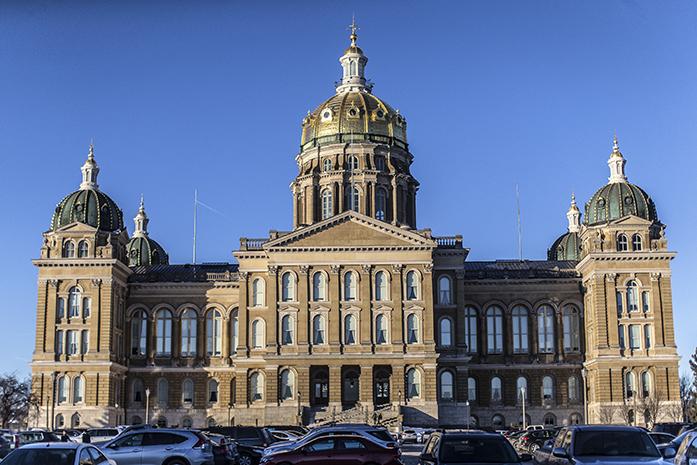Iowa’s road to restoring the right to vote to felons
Iowa and Kentucky are currently the only states with a lifetime voting ban for people convicted of all types of felonies. A constitutional amendment is the most permanent way to reverse this policy.
The Iowa State Capitol is shown on Tuesday, Jan. 13, 2015.
December 3, 2018
Iowa remains one of two states with a lifetime voting ban for all citizens convicted of felonies. As the trend toward restoring felons’ voting rights shifts throughout the country, an Iowa constitutional amendment, executive order, or bill could shape the futures of the around 52,000 Iowans convicted of felonies.
Individual applications to restore voting rights after completion of sentencing are currently at the discretion of Gov. Kim Reynolds.
She expressed openness to the restoration of voting rights to reporters on Nov. 20. She said she hopes to further address the issue in her January Condition of the State given at the beginning of the legislative session.
Iowa Senate President Jack Whitver, R-Ankeny, said the GOP caucus has not yet considered the topic of felon-voting restoration in an interview with The Daily Iowan on Nov. 26.
“In Iowa, a person’s voter registration is canceled if the person is convicted of a felony,” communications director of the Iowa Secretary of State’s Office Kevin Hall said in an email to The Daily Iowan. “Voting rights may be restored by application to the Governor’s Office.”
Lawyer Thomas Walton, the chair of the legislative advisory board of the Criminal and Juvenile Justice Planning Advisory Council, said it unanimously voted in support of felon-voting restoration in November.
Walton said he sees a trend of states restoring voting rights and thinks there is a good prospect that something could be accomplished in Iowa as well.
“My impression is that this issue is becoming more bipartisan, that the Republicans view it as an issue of freedom, and the Democrats view it at as an issue of equality,” Walton said.
He said he thinks one of the reasons Iowa has stayed in the minority of states who have restored felons’ ability to vote is that Iowa has a provision in its constitution stating that anyone convicted of an infamous crime cannot vote. As interpreted by the Iowa Supreme Court, infamous crimes include felonies, Walton said.
In 2016, a 4-3 Iowa Supreme Court decision upheld the voting ban for felons and ruled that an “infamous crime” is generally accepted as a felony.
RELATED: Iowans back voter ID
Walton said there are two ways Iowa could restore voting rights to felons. One would be an amendment to the Constitution, and another would be a legislative bill redefining the term “infamous crimes.”
An Iowa constitutional amendment is the only way to permanently restore voting rights to people convicted of felonies, and it would require the approval of the majority of two Legislatures.
A bill redefining “infamous crimes” would limit the restriction of voting to only certain felonies or crimes, such as A and B class felonies or murder convictions, Walton said.
Sean Morales-Doyle, a counsel at the Brennan Center for Justice in New York City, said an executive order by the governor could also restore voting rights.
There is precedent for executive action in felon voter restoration in Iowa, Morales-Doyle said. In 2005, former Iowa Gov. Tom Vilsack, a Democrat, issued Executive Order 42, which reinstated felon voting rights for six years. Morales-Doyle said this granted the right to vote around 115,000 Iowans. The policy was rescinded by former Gov. Terry Branstad, a Republican, in 2011.
RELATED: Iowa Supreme Court mulls voting rights for felons
Critics of allowing felons to vote generally argue that high-level criminals should lose the right to vote as a penalty for their wrongdoings.
“Sometimes for political reasons, elected officials may not want to restore voting rights because someone may argue they’re soft on crime,” Walton said.
However, he said, members of the legislative advisory board argued that “not restoring voting rights would disproportionately impact minority groups and the poor.”
Although not all prisoners are felons, according to the 2018 Iowa Prison Population Forecast, 33.7 percent of Iowa prisoners are nonwhite. Iowa is 14.3 percent nonwhite according to the 2017 U.S. Census Bureau report.
“When people are getting out of prison and coming back to their communities, it’s in everyone’s best interest to welcome them to fully reintegrate in a healthy way into their communities,” Morales-Doyle said.







